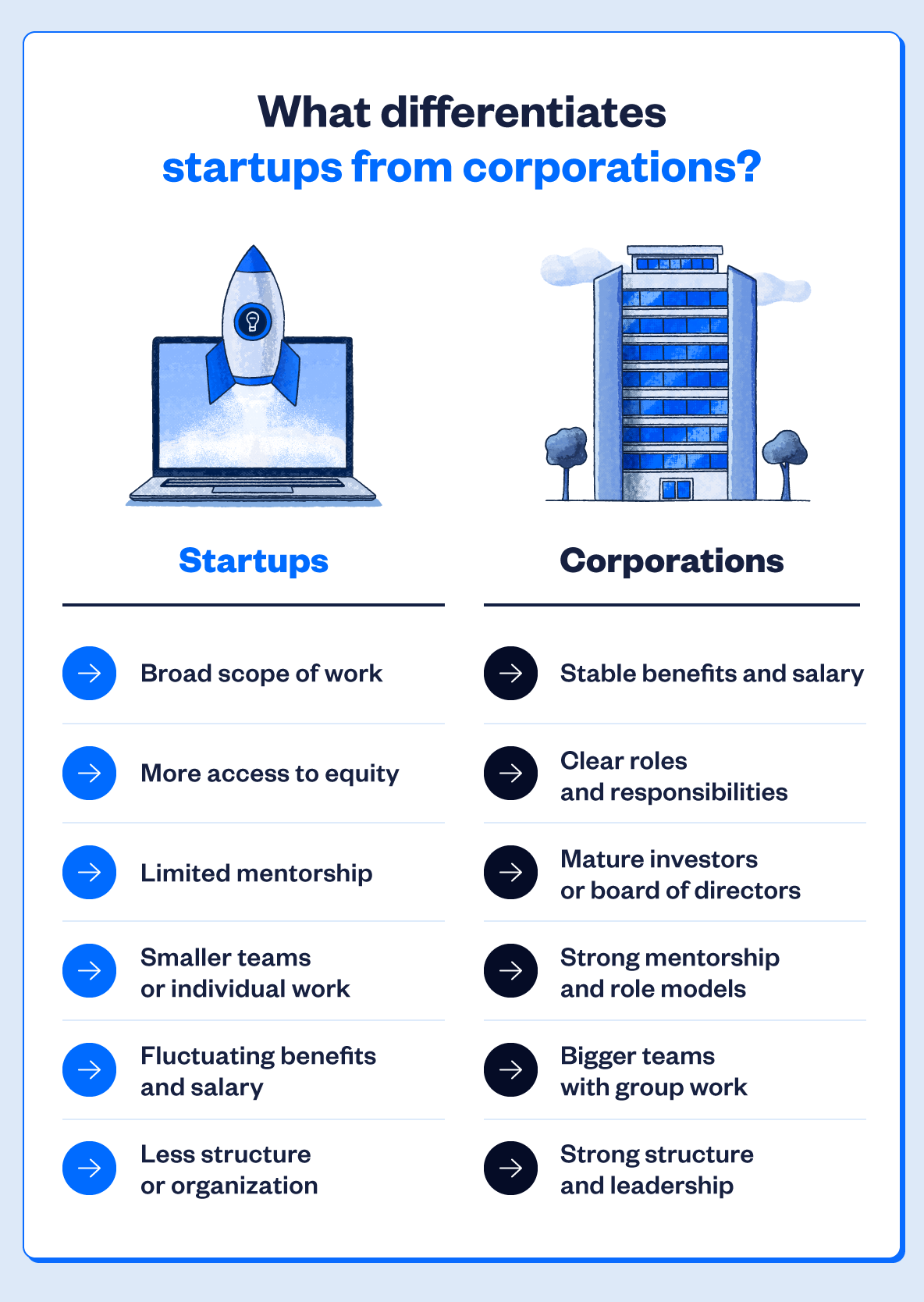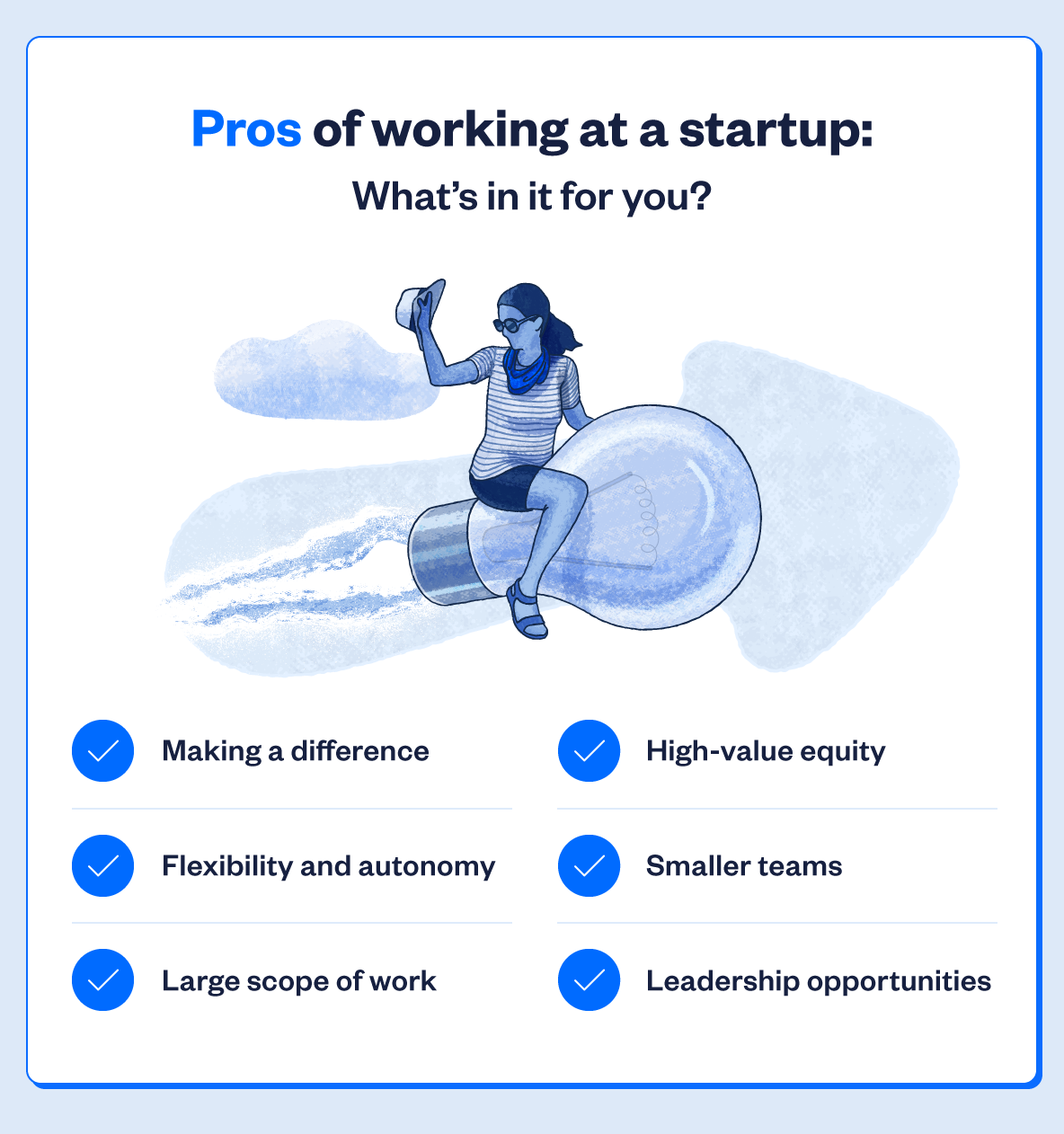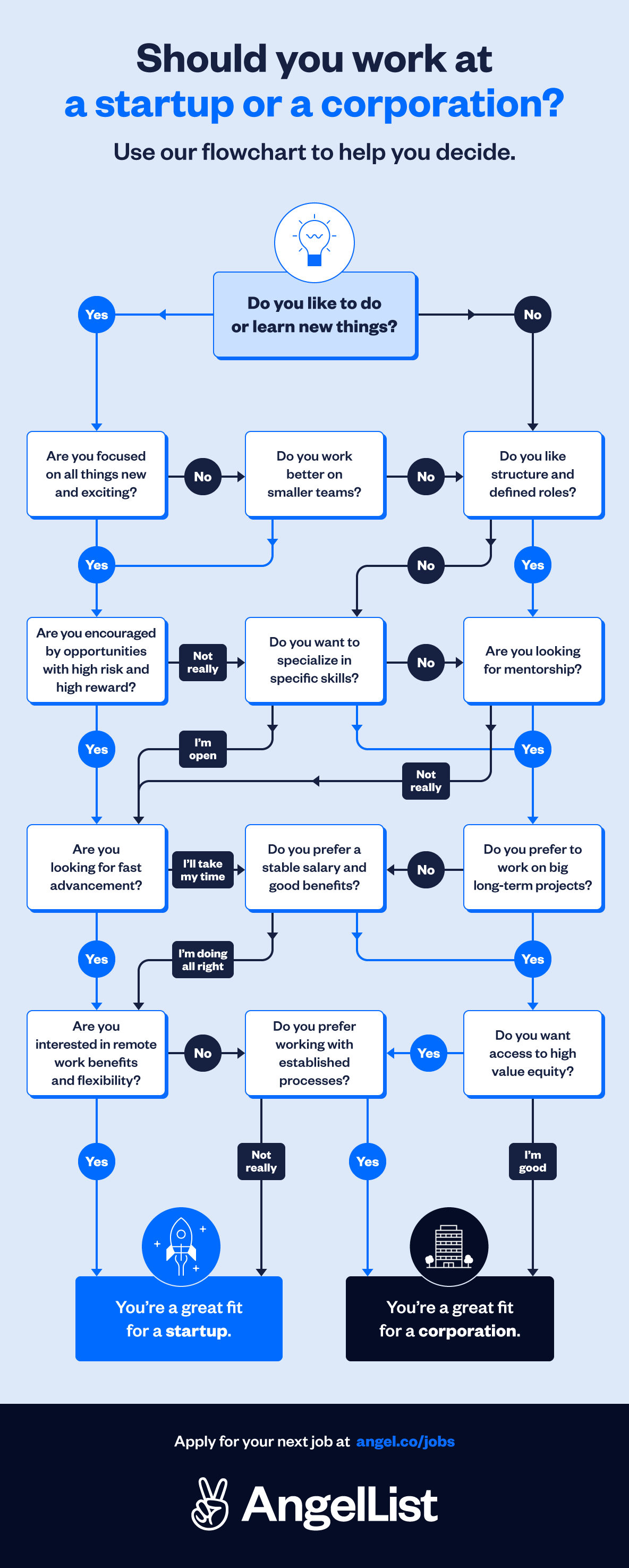Startup vs. corporate: What’s best for your career?
Startups and corporate companies are some of the greatest employers of tech professionals, but when it comes time to choose, which of the two comes out on top? While job-seekers used to prefer the stability of Big Tech, more tech candidates are opting for smaller companies.

The shift from corporations to startups in the tech world is directly related to employees prioritizing their autonomy and work-life balance through remote work. Since the pandemic, US-based tech employees said that they now prioritize flexibility and the benefits of remote work — attributes many startup companies boast.
In this article we will dive into how to decide between working at a startup vs corporate company based on a variety of factors such as benefits, leadership opportunities, growth tracks, and overall job satisfaction.
How is working at a startup different from a larger, more established company?

Startups are early-stage companies with up to 50 employees who are working on launching their product. With funding from investors, they’re able to get their company off the ground and work speedily to see fast growth.
Between startups and corporations, there are plenty of differentiating characteristics, the biggest one being size. Small startups can have five employees while bigger startups can have 50. On the other hand, corporations can have hundreds if not thousands of employees.
Another big difference between working at a startup vs. a corporate company is that startups typically have less structure and specialized roles. Everyone pitches in where they can and the needs of the business are always changing.
Advantages of startups

Joining a startup offers numerous benefits such as the flexibility to work remotely, smaller teams, and seeing faster growth in your career. Depending on your priorities, these advantages of startup employment could help you determine the next steps in your career.
Making a difference
Startups have smaller teams so all the work you do will make a big difference, and you will be able to see the fruits of your labor, like building a website as a web developer, much sooner.
Flexibility and autonomy
More and more tech employees are moving to startups given their flexibility and remote work benefits, which is especially helpful for workers with disabilities. This can ultimately result in better work-life balance, as a high amount of tech workers experience burnout.
Large scope of work
Startups have many opportunities for different types of work if you’re a fast-paced individual who gets bored easily. If you’re looking to expand your coding skills in a variety of languages in a short amount of time, startups may be your best bet.
High-value equity
A huge startup draw is getting access to potentially high-value equity pre-IPO. Many tech professionals are fortunate enough to gain equity at a startup early in the game only for the company to become extremely successful later on. The range for startup employee stock option pools will often be somewhere between 5% and 30%.
Smaller teams
If the thought of working on a smaller and more intimate team appeals to you, then a startup might be the right fit. Independent and autonomous employees will find the startup environment conducive to their success based on their work style.
Leadership opportunities
Startups give employees more opportunity to grow within the company in comparison to a corporation with thousands of employees. It’s easier and faster to move up at a startup since you’re more likely to stand out and get recognized for your hard work.
3 Downsides of working at a startup
While startups have numerous benefits when it comes to quickly advancing your career and learning a wide scope of skills quickly, for some the startup environment isn’t the right fit. Many professionals are wary of working a startup due to challenges like less structure, lack of mentorship, and wearing many hats at work.
Wearing many hats
It’s well-known that startup employees wear many hats; they have to take on responsibilities wherever possible since the teams are on the smaller side. If you like having varying tasks on a day-to-day basis, this might appeal to you.
Less structure
Another common characteristic of new and growing startups is the minimal structure. Much like employees having varying tasks, there are also less defined roles and responsibilities.
Smaller pool of mentors
Since the roles at a startup are loosely defined, it’s unlikely to receive the same type of mentorship that you might receive at established companies. Startups can be more focused on creating their product and making a presence than growing their internal employee support system, especially in their early stages.
3 Upsides of a corporate environment
Working at a startup for the first time might be intimidating, but corporate life is also a viable option for tech professionals. Many employees are drawn to big companies because of the stability and organization they have fostered over time.
Specialization
Unlike at a startup where each team member wears a variety of hats, established companies have defined roles where employees can focus on their top skills. Your role will be specialized and you won’t often find yourself completing tasks outside of that role.
Stable salary and benefits
While startups give employees access to high-value equity, big companies are known for providing a stable salary and great benefits to their employees. Corporations give employees a sense of stability, whereas startups are often high risk but high reward.
Access to mentorship
Mature companies offer better access to role models that you can learn from in specific industries. In a corporate setting, you will often have a direct manager who serves as your mentor and role model in the position. They usually guide you through the onboarding process and job functions, whereas at a startup you may jump right into things.
Disadvantages of choosing a corporate company
More and more tech professionals are shifting from corporate to startup jobs. Whether that be due to remote work flexibility, slow movement, or burnout, employees are prioritizing themselves given the less-than-satisfactory aspects of working at a corporation. Below are some points to consider before deciding to work for corporate tech companies.
Slow movement
Startups are known for being fast-paced and agile businesses that accomplish goals quickly. On the other hand, mature companies can take weeks to months to launch a project since there are more eyes on the work.
Older software or tools
If you like to use the newest technology or software, startups might be a better fit for you, as mature companies often have less contemporary technology available to their employees. Tech startups focus on efficiency so they’re more likely to use up-to-date project management tools than their corporate counterparts who are focused more on uniformity.
Narrow scope of work
If you prefer to try something new every day, the corporate world may not be for you, as the scope of work is focused on your job functions. It’s less likely that you will be able to branch out of your comfort zone at a mature business. Get bored doing the same thing day in and day out? Startup culture may provide more novelty in your day-to-day life.
Should you work at a startup or corporate company?
We’ve given you the pros and cons of both startups and big companies — still not sure where to go from here? Below are some signs to look for to determine whether you’re a better fit for a startup or corporate life.
What’s more is that we’ve crafted a unique flowchart to follow to help you figure out if your career will benefit more from startup or corporate culture.
Signs you should work at a startup
Read below to identify some signs that you might find yourself happier working at a startup than at a big company.
- You like to do or learn new things
- You’re looking to expand your coding experience
- You want access to equity and stock options
- You’re focused on all things new and exciting in business
- You prefer a smaller team
- You want to build on the latest and greatest technologies
- You want flexible hours
- You’re looking for fast advancements in the company
- You’re encouraged by high risk and high reward
Signs you should work at a corporate company
The signs below might signal to you that corporate life is calling your name — and you might want to answer the call!
- You like structure and defined roles
- You prefer a stable salary and good benefits
- You’re looking for mentorship
- You want to specialize in specific skills in your field
- You prefer working with a mature code base
- You would rather work on big, long-term projects than short-term ones
Still trying to decide? Take a look at our flowchart to help you pinpoint your next career move.

Wrapping up: Finding your fit with Wellfound
While startup and corporate employees both can argue their experience is better for their career, it’s all about finding the right fit for you. This involves identifying your work style, how you work most efficiently, and how your next role will impact your future career goals.
If you’re looking for structure, specialization, and mentorship, opt for a mature company.
On the other hand, if you are looking for something new and exciting with a lot of potential, explore the thousands of jobs in the startup world.



